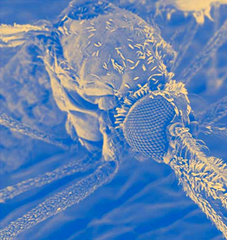Gene That Helps Mosquitoes Fight Off Malaria Parasite Identified
Researchers have identified a gene in mosquitoes that helps the insects to fight off infection by the Plasmodium parasite, which causes malaria in humans. Anopheles mosquitoes transmit the malaria parasite to nearly 550 million people worldwide each year with these cases resulting in more than 2 million deaths annually. The protective gene was identified in a study conducted by a team of investigators from the Johns Hopkins Bloomberg School of Public Health’s Malaria Research Institute, the Imperial College of London and the University of Texas Medical Branch. It will be published in the Online Early Edition of the Proceedings of the National Academy of Sciences the week of October 24.
The malaria-causing Plasmodium has a complex life cycle. Mosquitoes become infected with the parasite when they draw blood from humans who have malaria. As the parasite matures, it moves from the mosquito’s midgut to its salivary glands. Once in the salivary glands, the Plasmodium can be injected into another human when the mosquito feeds again.
In the study, the researchers determined that the SPRN6 gene, which is normally switched off in Anopheles stephensi and Anopheles gambiae mosquitoes, is switched on when they are infected with the malaria parasite. To determine the function of SPRN6, the researchers deactivated the gene in the mosquitoes through a process called RNA interference. They observed that the number of parasites that developed in Anopheles stephensi mosquitoes increased three-fold when the gene was knocked out. In Anopheles gambiae mosquitoes, removing the SPRN6 gene delayed the process of parasite lysis, whereby the mosquito rids itself of the parasite.

Anopheles mosquito
“This study furthers our knowledge of the malaria-parasite lysis in mosquitoes. It may help provide better tools for controlling the disease in the future,” said lead author Eappen G. Abraham, PhD, research associate in the Department of Molecular Microbiology and Immunology and the Malaria Research Institute at the Bloomberg School of Public Health.
“These results provided new insights into how the mosquito defends itself from the malaria parasite. More research is needed, but we plan to apply this knowledge in the development of new approaches to control the disease,” said co-author Marcelo Jacobs-Lorena, PhD, a professor in the Department of Molecular Microbiology and Immunology and the Malaria Research Institute at the Bloomberg School of Public Health.
Abraham and Jacobs-Lorena are developing a transgenic mosquito in which the SPRN6 gene is permanently switched on, in an effort to create a mosquito that would be immune to the Plasmodium parasite. They believe that such a mosquito could help disrupt the transmission of malaria to humans.
“An immune-responsive serpin, SRPN6, mediates mosquito defense against malaria parasites” was written by Eappen G. Abraham, Sofia Pinto, Anil Ghosh, Dana L. Vanlandingham, Aidan Budd, Stephen Higgs, Fotis C. Kafatos, Marcelo Jacobs-Lorena and Kristin Michel. Abraham, Ghosh and Jacobs-Lorena are with the Johns Hopkins Bloomberg School of Public Health. Pinto, Budd, Kafatos and Michel are with the European Molecular Biology Laboratory in Heidelberg, Germany and the Imperial College of London. Vanlandingham and Higgs are with the Department of Pathology at the University of Texas Medical Branch.
Funding was provided by the European Molecular Biology Laboratory and grants from the National Institutes of Health, the Defense Advanced Research Planning Agency, the Chemical Biological and Radiological Sciences and Technology Defense Branch of the Naval Surface Center, and the German Research Foundation.
Public Affairs media contacts for the Johns Hopkins Bloomberg School of Public Health: Tim Parsons or Kenna Lowe at 410-955-6878 or paffairs@jhsph.edu.